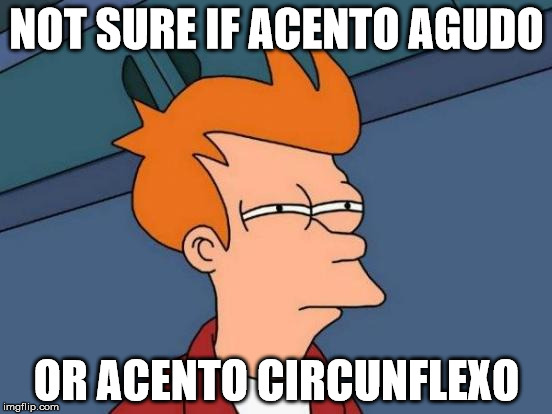
- Acento agudo (acute accent): It is always used above any vowel to indicate this vowel is part of the stressed syllable. It also indicates that the vowel sound is an open sound.
Exemplos:
- Ela é uma menina amável. (She is a lovely girl)
- Esse não é um assunto típico da aula de física. (This is not a typical subject for a physics class)
- O ar hoje está húmido. (the air is humid today)
- Eu tomo o meu chá com açúcar. (I drink my tea with sugar)
- Eu gosto de café em pó. (I like powder coffee)
- Meu pé está (My foot hurts)
- Acento circunflexo (circumflex accent): it is always used above the vowels a, e and o to indicate the stressed syllable. It also indicates a closed vowel sound.
Exemplo:
- Hugo faz aniversário este mês. (Hugo’s birthday is this month)
- O inglês do Lucas é muito bom. (Luca’s English is very good)
- O meu avô é viúvo. (My grandfather is a widower)
- O fotografo comprou uma câmera (The photographer bought a new camera)
- Acento grave (grave accent): also known as crase, it is used when you need the use the preposition a followed by the article a. It is a fusion of the two.
Exemplo: Take a look at the two examples below and if you need more information on this, there is a different post about verbs that always need preposition: click here.
- Eu não fui à festa ontem. (I didn’t go to the party yesterday)
(ir a + a festa = à festa)
- Eu respondi sim àquele rapaz. (I answered yes to that guy)
(responder a + aquele = responder àquele)
- Til (tilde): it is used above the vowels a or o to indicate a nasal sound.
Exemplo:
- Eu comprei uma camisa de lã bem quente. (I bought a very warm wool shirt)
- Suzana come maçã todos os dias. (Suzana eats apples every day)
- Meu coração está batendo rápido. (My heart is beating fast)
- Minha mãe comprou 3 melões no supermercado. (My mother bought 3 melons at the supermarket)
Even though the accents should always be used, many Brazilians still have some difficulty remembering them from time to time. So don’t be too hard on youself if it takes some time for you to get used to them. Remember: the more you read, the more you will learn!
É isso por hoje, pessoal. Tenham uma boa semana!
That’s it for today guys. Have a good week!





